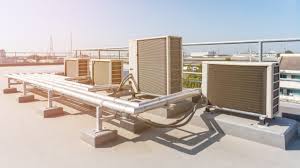Installing a split system air conditioner begins with determining the location of the equipment. Since split systems consist of two or more units, you must choose a place for both. You must also consider how cold air will spread in the house or apartment and the technical requirements.
- The outdoor unit is usually placed near a window or on an open balcony if there is one.
- A glazed balcony/loggia can be installed on a fence (if it has sufficient load-bearing capacity) or on the wall nearby.
- If you live on the first or second floor of a multi-story building, they try to place the outdoor unit above the window level, away from passers-by.
- It can be placed under the window or on the side of higher floors.
If you plan to install an air conditioner yourself in a private house, the location is usually chosen based on the load-bearing capacity of the walls. You can use a special mount or hang the unit on the base if there is a ventilated facade.
More: How to Select the Right AC Unit for Your Home
Pros and Cons of Rooftop Units
Commercial rooftop HVAC units are simple, compact, and occupy little space. Instead of two separate systems, the entire heating and air conditioning system is often housed in one unit. RTUs are common in small commercial buildings, retail stores, and restaurants and supply warm and cool air to the building through ductwork.
Pros of Rooftop HVAC Systems

- They are out of the way. Rooftop units are located away from prying eyes, including customers and employees. RTUs are typically more protected from security threats or vandalism than side or rear HVAC units. You also don’t have to create additional space for these units.
- Noise is typically away from occupants. During operation, the noise of rooftop units is also normally unnoticeable because RTUs are located away from employee work areas or customer areas.
- There will be no dirt around them. While RTUs require regular cleaning and maintenance, placing them on the roof often throws less dirt and debris onto the system. This means fewer dirt-clogging parts, which results in less wear and tear on the unit.
Cons of Rooftop HVAC Systems
- They are heavy. Although systems have become smaller and more compact, they still weigh a lot. You need to make sure that you have structural support for the RTU. If the roof of your commercial building is not strong enough, water leaks can occur, leading to more serious problems.
- Location matters. Like weight, rooftop location can make a big difference. Unfortunately, this is most often due to poor installation. For example, if the RTU is installed in a low spot, water can pool and damage the unit or roof.
- Out of sight, out of mind. Many people like this, but it can also mean that business owners may forget about maintenance and upkeep. Be sure to schedule maintenance for the unit twice a year or consider booking regular maintenance to prevent the unit from deteriorating faster than it should.
- Weather conditions and birds can be problems. While the unit may be protected from dirt, it is still exposed to the elements. There is a chance of damage from lightning. Depending on the height of your building, birds can also cause problems. Talk to your HVAC company about how to avoid the latter.
Schedule Commercial Rooftop Service
So, is a rooftop unit right for your building? Ultimately, your HVAC company should advise you on that. But despite the drawbacks, it may be the best option, depending on your HVAC system needs. Contact https://www.kan-service.com/ today for ac installation Los Angeles, rooftop repair, or maintenance. Our experienced team is trained to handle all types of commercial rooftop units.
How Much Does It Cost to Install an Air Conditioner in Los Angeles?
The cost of installing an air conditioner is determined by several factors. For example, the size and layout of your home, the age and condition of your existing ductwork, and the size and model of the air conditioner you choose can all impact the installation cost.
Homeowners should also budget for the cost of running the unit.
However, replacing an older air conditioner with a newer model may be more energy efficient, resulting in lower energy bills.
When Should I Replace My Air Conditioner?
So, if your air conditioner has been running for more than a decade, it may be time to replace it rather than repair it, as you will likely need to buy a new one soon anyway. Additionally, if your air conditioner is old and has started to break down frequently, the cost of repairing it again may be better spent on a new one. On the other hand, if your central air conditioner is relatively new or the repairs are minor, it is likely better to repair it.

